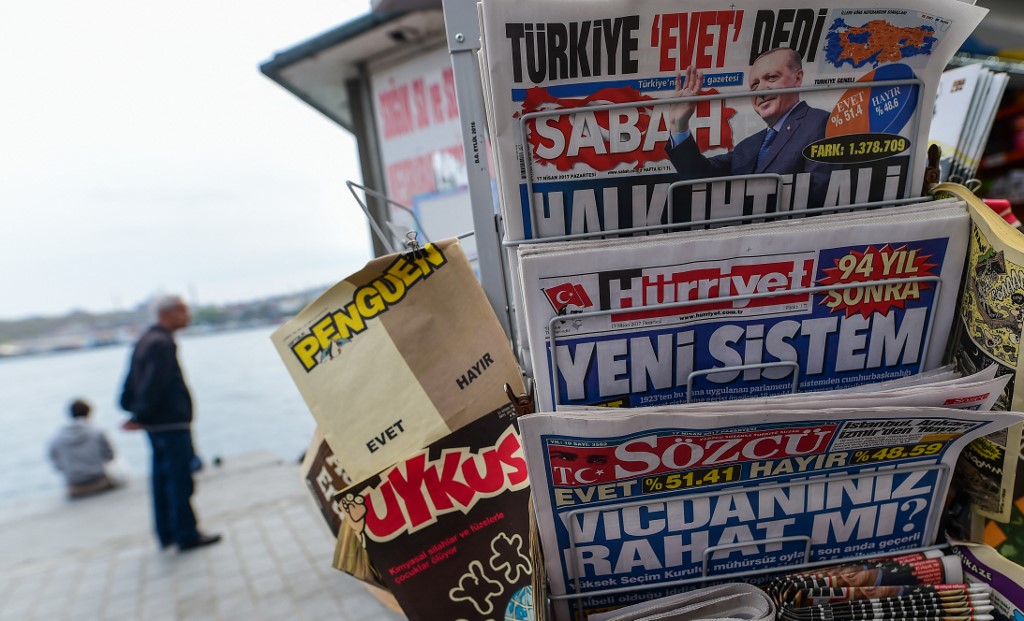Sevgi Akarçeşme
July 15, 2016 is not only the date of a botched coup attempt in Turkey’s tumultuous history, but also for millions of people the end of life as they knew it due to a subsequent purge that targeted all real and perceived supporters of the faith-based Gülen movement. Nothing has ever been the same for many innocent people from all walks of life. The Turkey we knew is extinct, and the country has totally been turned on its head. Its media is not immune from this downward spiral.
Even before July 15, Turkey had become a living hell for journalists like myself. The turning point was the Dec. 17-25, 2013 corruption investigations, which implicated then-Prime Minister Recep Tayyip Erdoğan and his family. Any media outlet that did not turn a blind eye to the evidence of serious corruption was declared an enemy of the state. The large media group I worked for at Today’s Zaman was raided by the police a year later following a vicious campaign of demonization. Shortly before the Nov 1, 2015 repeat elections, the government unlawfully took over Koza İpek Media and shut down a major news channel due to its critical editorial stance. After securing a new mandate in those elections, Erdoğan had no obstacle left preventing him from bulldozing our media group. When I took the helm as editor-in-chief of Today’s Zaman under that pressure, I knew our time was limited. Finally, on March 4, 2016, police violently raided our newspaper headquarters. As our paper was accused of supporting “terrorism,” I knew prosecution was just around the corner for other executives and me, and I fled my home country two days after the raid.
In the immediate aftermath of the July 15 coup attempt, 53 newspapers, 19 TV stations and six news agencies were shut down by means of presidential decrees. No wonder President Erdoğan called July 15, on the very same night, as the attempt, a “gift from God.” This gift served as a perfect tool for the government to consolidate its one-man rule and increase its oppression, particularly of Gülen movement followers and Kurds. In an unprecedented climate of fear, the remaining critical media was even more repressed. According to the regime, July 15 was without a doubt a coup attempt planned and orchestrated by the Gülen movement. After July 15, the regime declared the movement the “Fetullahist Terrorist Organization” (FETÖ) in order to criminalize its supporters. The government’s “FETÖ” narrative is used almost exclusively by the media. In that sense, the media in Turkey is more imprisoned than ever, even outside prison walls. Aside from a few opposition TV stations and newspapers that parrot the same narrative, the rest is fully controlled and indirectly financed by the regime.
Another narrative that the main opposition party voiced for a while was that July 15 was a “staged coup,” but this argument was not debated inside Turkey as it was risky to stray from the boundaries of the regime’s rhetoric.
As I stated several times on Twitter and elsewhere, Turkey is a society of ideological tribes. The media is not immune from this malady.
In the wake of July 15, Turkish media in exile ultimately flourished. Being able to speak from abroad, though with extremely limited resources, these exiled journalists and outlets had one thing that their counterparts in Turkey did not: freedom.
Turkish media in exile is roughly composed of two groups: Gülen movement-linked journalists and Kurds. Since human rights abuses targeting both groups are so widespread, each group is preoccupied with violations towards their own groups. In a way, Turkey’s media abroad is also tribal, some willingly, some inevitably.
When it comes to investigating July 15, journalists in exile often emphasize the narrative that their group likes to hear. While rightfully opposing the FETÖ narrative, the Gülen-linked media outlets and journalists abroad often, if not always, overlook the involvement of Gülenist actors on July 15. Their main argument is that some people close to the movement were pulled into a “trap” without really explaining the role of Gülen-linked civilians on that night. On the contrary, those who investigate the movement’s involvement and its extent are demonized by staunch believers of the movement.
Such partial obfuscation prevents getting the full picture and hurts the credibility of these media outlets.
Meanwhile, Turkey continues to be one of the world’s biggest jailers of journalists. Indeed, even social media users frequently face detention and arrest if they imply criticism of the one-man rule. In that sense, obstruction of freedom of expression is not limited to journalists. Turkey has long been an open-air prison.
Five years after July 15, those who seek the truth and only the truth are far from learning it because of the harsh oppression inside Turkey and the selective nature of the media in exile.
Sevgi Akarçeşme is the former editor-in-chief of Today’s Zaman and Turkish Minute.

